
Post-Op Follow-Up Schedule That Prevents Prosthetic Delays (For Clinicians)
For many clinicians, the surgery is only the first step. What happens after the operation

Every child deserves a school environment where they feel safe, confident, and included. For children with prosthetic limbs, school life can come with unique challenges—both physical and emotional. While some children adapt easily, others may need extra support from teachers, classmates, and school staff to feel comfortable and fully participate in activities.
The good news is that schools can make a huge difference. By creating an inclusive, understanding, and accessible environment, educators can help children with prosthetic limbs thrive both academically and socially. In this article, we will explore practical ways schools can support these children, from classroom adaptations to emotional encouragement and peer inclusion.
Let’s dive in.
The first step in supporting children with prosthetic limbs is ensuring the school environment is physically accessible. This means making sure classrooms, playgrounds, and other facilities are designed in a way that allows every child to move freely and safely.
Hallways and doorways should be wide enough for children with prosthetic limbs to navigate comfortably. If the school has stairs, ramps and elevators should be available as alternatives. Uneven surfaces or slippery floors can make walking difficult, so regular maintenance is important to ensure a safe environment.
Desks and seating arrangements should also be flexible. Some children with prosthetic arms may need more space to move freely, while those with prosthetic legs may require seating that supports a comfortable posture. Schools can work with students and their parents to identify any necessary modifications to create a learning space that suits their needs.

Teachers play a critical role in shaping a child’s school experience. When they are knowledgeable about prosthetics, they can offer the right kind of support and encouragement to students with limb differences.
Schools should provide training for teachers and staff on how prosthetic limbs work and what challenges children might face. This will help educators understand mobility concerns, activity limitations, and potential adjustments that can make learning easier for the child. Simple things like allowing extra time for certain tasks or recognizing signs of discomfort can make a big difference.
Beyond physical support, emotional understanding is just as important. Teachers should be aware of the social and emotional struggles some children may experience. Encouraging open conversations and creating a positive classroom atmosphere can help children with prosthetic limbs feel accepted and confident.
A big part of a child’s school experience is social interaction. Friendships, group activities, and playtime are essential for emotional growth. However, children with prosthetic limbs may sometimes feel different from their peers, leading to feelings of isolation. Schools can take steps to prevent this and foster inclusion.
One of the best ways to build understanding is through awareness programs. Teachers can educate students about prosthetic limbs in a simple and engaging way. This helps reduce curiosity-driven questions and prevents misunderstandings that could lead to teasing or exclusion. When classmates understand prosthetics, they are more likely to treat their peers with kindness and acceptance.
Schools can also create buddy systems, where students are paired with classmates who can offer support and friendship. Encouraging teamwork in group projects and physical activities ensures that children with prosthetic limbs are fully included in school life. The goal is to create a culture of acceptance where all children feel valued.
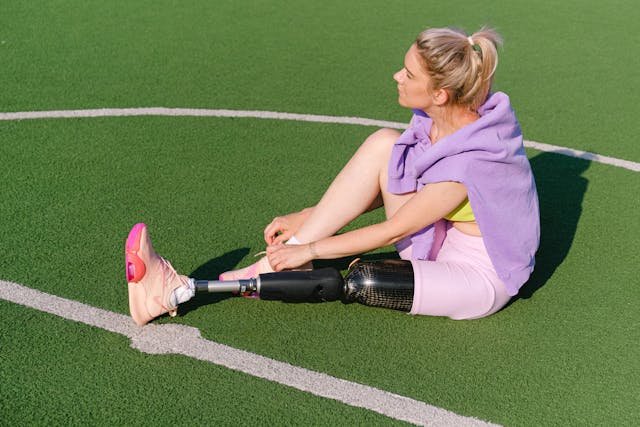
Physical activity is crucial for every child, including those with prosthetic limbs. However, traditional physical education (PE) classes may not always be designed with accessibility in mind. Schools must take steps to ensure that children with prosthetics can participate in sports and activities safely and comfortably.
PE teachers should work closely with students to understand their abilities and limitations. Some children may need modifications, such as using adaptive sports equipment or different warm-up routines to prevent strain. Offering a variety of activities ensures that every child can find something they enjoy, whether it’s running, swimming, or playing a team sport.
Extracurricular activities should also be inclusive. Art, music, and drama programs should be designed to accommodate all students, regardless of physical ability. When children with prosthetic limbs are encouraged to take part in creative and athletic pursuits, it boosts their confidence and helps them feel like they truly belong.
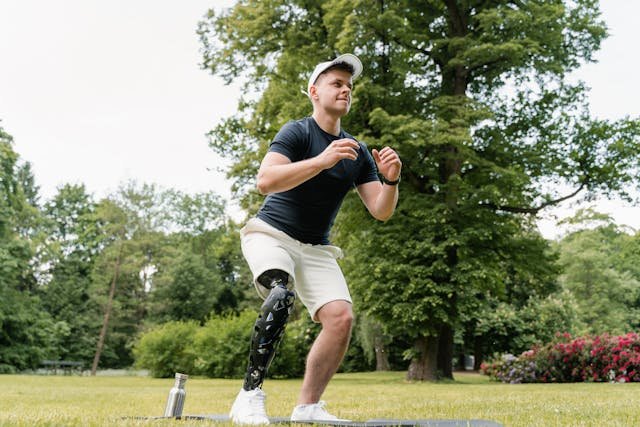
Adjusting to life with a prosthetic limb can be challenging, especially in a school setting where children are naturally curious. Some students may feel self-conscious or worry about being treated differently. This is where emotional support from teachers, counselors, and peers becomes essential.
School counselors should be available to talk to students who may need help adjusting emotionally. Some children may feel frustrated by physical limitations, while others might struggle with body image or social anxiety. Having a trusted adult to talk to can provide reassurance and help children build confidence.
Encouraging self-advocacy is another important step. Children should feel comfortable expressing their needs and asking for support when necessary. Teachers can help by fostering open communication, listening to concerns, and reinforcing the idea that every child has unique strengths and challenges.
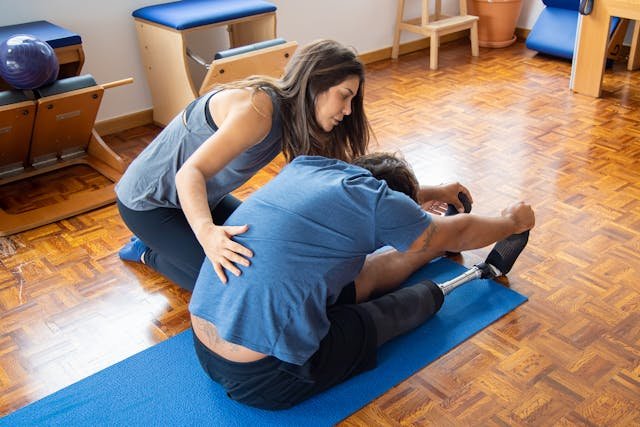
Parents play a key role in ensuring their child’s school experience is positive and enriching. Schools should maintain open communication with families to better understand the specific needs of each child. Regular meetings with parents can help educators stay informed about medical updates, necessary adjustments, or any concerns the child might have.
Parents can also help by sharing insights on how their child interacts best in different environments. Whether it’s understanding fatigue levels, preferred seating arrangements, or strategies for social interactions, this information can help schools create a supportive learning atmosphere.
Collaboration between parents and teachers can also extend to social activities. Schools can invite parents to speak about their child’s journey, helping classmates develop empathy and understanding. The more children and parents are involved in discussions about inclusion, the more natural and accepting the school environment becomes.
One of the most powerful ways schools can support children with prosthetic limbs is by creating a culture that celebrates differences rather than focusing on limitations. When diversity is embraced, all students—regardless of their abilities—feel valued and included.
Teachers can integrate discussions about disability and inclusivity into their lessons. Reading books or showing videos that feature characters with prosthetic limbs can help normalize the experience. When children see positive representations of people like them, it reinforces self-acceptance and self-worth.
Celebrating achievements is also important. Recognizing a child’s efforts—whether in academics, sports, or social contributions—helps them feel seen and appreciated. Schools should ensure that success is defined in many ways, not just through traditional measures like physical ability or competition.
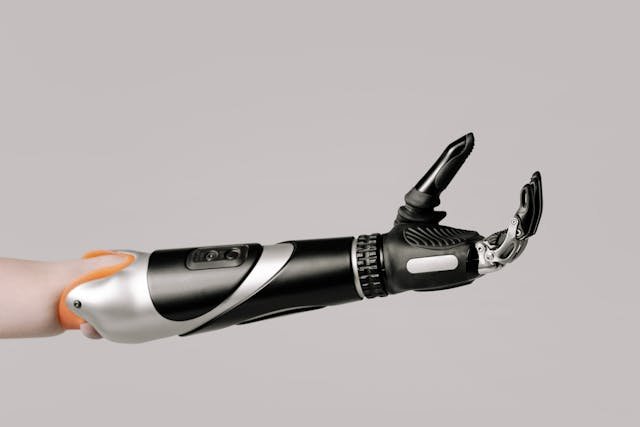
Technology is playing an increasingly important role in education, and for children with prosthetic limbs, assistive technology can make learning more accessible and engaging. Schools that integrate the right tools can help students with prosthetics participate fully in both academic and creative activities.
One of the most effective tools is voice-to-text software. Some children with upper-limb prosthetics may find writing or typing tiring, especially during long assignments. Voice recognition tools allow students to dictate their work, reducing strain and making it easier to complete tasks without frustration.
Interactive smartboards and touchscreen devices also help by making learning more hands-on. Instead of traditional methods that require fine motor skills, students can engage with lessons using touch-based technology. This is particularly helpful in subjects like math and science, where visual and interactive learning improves comprehension.
Virtual reality (VR) and augmented reality (AR) are also being used in schools to create inclusive learning experiences. These technologies allow students with prosthetics to engage in simulations, practice real-world skills, and explore environments that might otherwise be difficult to navigate. By incorporating technology into education, schools can ensure that every child has equal opportunities to succeed.
Even in the most supportive environments, children with prosthetic limbs may still face curiosity, misunderstandings, or even bullying from their peers. Schools must take an active role in creating a culture of respect to ensure that all students feel safe and valued.
The first step is educating students about differences in a way that encourages empathy. Many children may not understand what a prosthetic limb is or why someone needs one. Teachers can hold classroom discussions that normalize limb differences, answer questions in an open and honest way, and emphasize the importance of treating all classmates with kindness.
Schools should also have strict anti-bullying policies in place. If teasing or exclusion occurs, teachers must intervene quickly and address the situation. Encouraging children to stand up for their peers and practice kindness goes a long way in building an inclusive school culture.
Another powerful tool is peer mentorship. Pairing children with prosthetic limbs with supportive classmates helps build friendships and ensures they never feel alone. When students look out for one another, the entire school community becomes stronger and more inclusive.
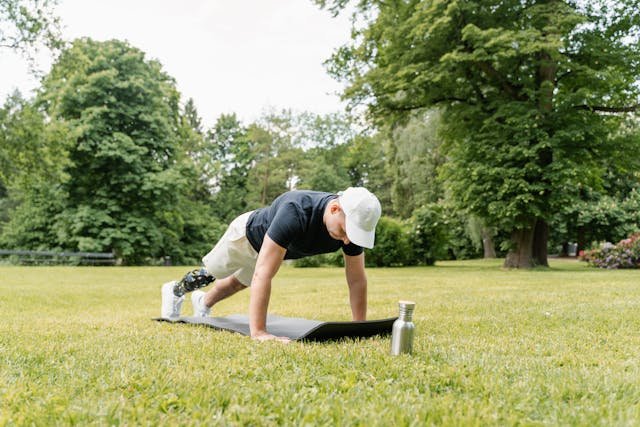
While school support is important, it’s equally crucial to empower children with prosthetic limbs to become independent and confident in advocating for their needs. Schools should encourage students to express what works best for them, whether it’s asking for help, requesting classroom modifications, or explaining their prosthetic to others.
One way to build independence is by teaching self-care routines. Some children may need to adjust their prosthetic throughout the school day, and they should feel comfortable doing so. Schools can provide private spaces where students can make adjustments if needed, ensuring they feel confident managing their prosthetic on their own.
Encouraging students to take part in leadership roles also boosts confidence. Whether it’s joining student councils, leading a group project, or participating in public speaking, these experiences help children develop a strong sense of self-worth. When children with prosthetic limbs see that they are just as capable as their peers, they gain the confidence to pursue their dreams without limitations.
Field trips, outdoor learning experiences, and school camps are some of the most exciting parts of school life. However, for children with prosthetic limbs, these activities may come with extra challenges. Schools must ensure that every student can fully participate in these experiences.
Before planning a field trip, schools should assess accessibility. Are there ramps, smooth walking paths, and seating areas if a student needs to rest? Are there adaptive activities available if traditional ones are difficult for children with prosthetic limbs? Making these considerations ahead of time ensures a smooth experience for everyone.
Teachers should also communicate with students and parents before the trip to address any specific concerns. If a child needs additional support, the school can arrange for extra staff or make modifications to activities. Encouraging students to be part of the planning process helps them feel involved and valued.
When outdoor activities are well-planned and inclusive, children with prosthetic limbs get to enjoy the same adventures as their peers. Whether it’s visiting a science museum, going on a nature hike, or participating in a sports day, making adjustments ensures that no child is left out.
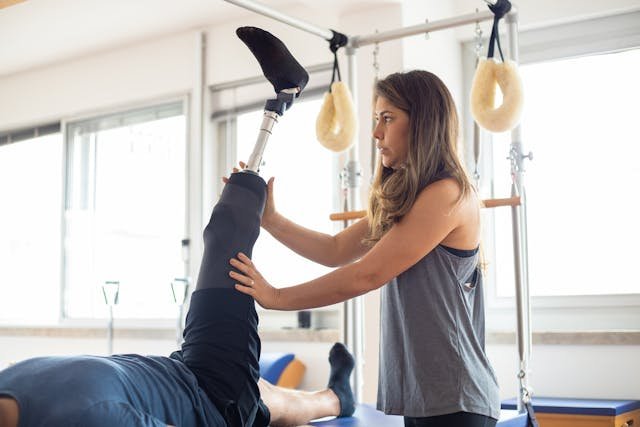
Adjusting to school life with a prosthetic limb isn’t just about physical challenges—it’s also an emotional journey. Some children may feel anxious about being different, while others may struggle with confidence or self-image. School counselors play a crucial role in helping children navigate these feelings and build resilience.
Counselors should offer one-on-one support to students who may need someone to talk to. This can help children express their feelings, overcome fears, and develop a positive outlook on their abilities. Regular check-ins ensure that any emotional struggles are addressed early on.
Group sessions and support circles can also be beneficial. Connecting with other students who face similar challenges can help children feel understood and less isolated. Schools can organize peer support groups where children share experiences, offer encouragement, and build friendships in a safe space.
Counselors should also work closely with teachers and parents to create personalized strategies that support the child’s emotional and social development. By ensuring children feel heard and supported, schools can help them grow into confident, self-assured individuals.
Supporting children with prosthetic limbs is not just about making physical adjustments—it’s about fostering an inclusive and encouraging environment where they can grow, learn, and build strong friendships. When schools take proactive steps to educate teachers, adapt activities, and promote understanding among peers, they create a space where every child feels welcome.
At Robobionics, we believe in empowering children with prosthetics to lead confident, independent lives. If you’re an educator or a parent looking for guidance on how to support a child with a prosthetic limb, reach out to us today. Together, we can build a world where every child has the opportunity to thrive.

For many clinicians, the surgery is only the first step. What happens after the operation
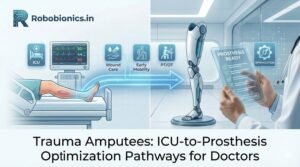
For trauma amputees, the journey does not begin at the prosthetic clinic. It begins much

Amputation after cancer is not just a surgical event. It is the end of one

When a child loses a limb, the challenge is never only physical. A child’s body
Last updated: November 10, 2022
Thank you for shopping at Robo Bionics.
If, for any reason, You are not completely satisfied with a purchase We invite You to review our policy on refunds and returns.
The following terms are applicable for any products that You purchased with Us.
The words of which the initial letter is capitalized have meanings defined under the following conditions. The following definitions shall have the same meaning regardless of whether they appear in singular or in plural.
For the purposes of this Return and Refund Policy:
Company (referred to as either “the Company”, “Robo Bionics”, “We”, “Us” or “Our” in this Agreement) refers to Bionic Hope Private Limited, Pearl Haven, 1st Floor Kumbharwada, Manickpur Near St. Michael’s Church Vasai Road West, Palghar Maharashtra 401202.
Goods refer to the items offered for sale on the Website.
Orders mean a request by You to purchase Goods from Us.
Service refers to the Services Provided like Online Demo and Live Demo.
Website refers to Robo Bionics, accessible from https://robobionics.in
You means the individual accessing or using the Service, or the company, or other legal entity on behalf of which such individual is accessing or using the Service, as applicable.
You are entitled to cancel Your Service Bookings within 7 days without giving any reason for doing so, before completion of Delivery.
The deadline for cancelling a Service Booking is 7 days from the date on which You received the Confirmation of Service.
In order to exercise Your right of cancellation, You must inform Us of your decision by means of a clear statement. You can inform us of your decision by:
We will reimburse You no later than 7 days from the day on which We receive your request for cancellation, if above criteria is met. We will use the same means of payment as You used for the Service Booking, and You will not incur any fees for such reimbursement.
Please note in case you miss a Service Booking or Re-schedule the same we shall only entertain the request once.
In order for the Goods to be eligible for a return, please make sure that:
The following Goods cannot be returned:
We reserve the right to refuse returns of any merchandise that does not meet the above return conditions in our sole discretion.
Only regular priced Goods may be refunded by 50%. Unfortunately, Goods on sale cannot be refunded. This exclusion may not apply to You if it is not permitted by applicable law.
You are responsible for the cost and risk of returning the Goods to Us. You should send the Goods at the following:
We cannot be held responsible for Goods damaged or lost in return shipment. Therefore, We recommend an insured and trackable courier service. We are unable to issue a refund without actual receipt of the Goods or proof of received return delivery.
If you have any questions about our Returns and Refunds Policy, please contact us:
Last Updated on: 1st Jan 2021
These Terms and Conditions (“Terms”) govern Your access to and use of the website, platforms, applications, products and services (ively, the “Services”) offered by Robo Bionics® (a registered trademark of Bionic Hope Private Limited, also used as a trade name), a company incorporated under the Companies Act, 2013, having its Corporate office at Pearl Heaven Bungalow, 1st Floor, Manickpur, Kumbharwada, Vasai Road (West), Palghar – 401202, Maharashtra, India (“Company”, “We”, “Us” or “Our”). By accessing or using the Services, You (each a “User”) agree to be bound by these Terms and all applicable laws and regulations. If You do not agree with any part of these Terms, You must immediately discontinue use of the Services.
1.1 “Individual Consumer” means a natural person aged eighteen (18) years or above who registers to use Our products or Services following evaluation and prescription by a Rehabilitation Council of India (“RCI”)–registered Prosthetist.
1.2 “Entity Consumer” means a corporate organisation, nonprofit entity, CSR sponsor or other registered organisation that sponsors one or more Individual Consumers to use Our products or Services.
1.3 “Clinic” means an RCI-registered Prosthetics and Orthotics centre or Prosthetist that purchases products and Services from Us for fitment to Individual Consumers.
1.4 “Platform” means RehabConnect™, Our online marketplace by which Individual or Entity Consumers connect with Clinics in their chosen locations.
1.5 “Products” means Grippy® Bionic Hand, Grippy® Mech, BrawnBand™, WeightBand™, consumables, accessories and related hardware.
1.6 “Apps” means Our clinician-facing and end-user software applications supporting Product use and data collection.
1.7 “Impact Dashboard™” means the analytics interface provided to CSR, NGO, corporate and hospital sponsors.
1.8 “Services” includes all Products, Apps, the Platform and the Impact Dashboard.
2.1 Individual Consumers must be at least eighteen (18) years old and undergo evaluation and prescription by an RCI-registered Prosthetist prior to purchase or use of any Products or Services.
2.2 Entity Consumers must be duly registered under the laws of India and may sponsor one or more Individual Consumers.
2.3 Clinics must maintain valid RCI registration and comply with all applicable clinical and professional standards.
3.1 Robo Bionics acts solely as an intermediary connecting Users with Clinics via the Platform. We do not endorse or guarantee the quality, legality or outcomes of services rendered by any Clinic. Each Clinic is solely responsible for its professional services and compliance with applicable laws and regulations.
4.1 All content, trademarks, logos, designs and software on Our website, Apps and Platform are the exclusive property of Bionic Hope Private Limited or its licensors.
4.2 Subject to these Terms, We grant You a limited, non-exclusive, non-transferable, revocable license to use the Services for personal, non-commercial purposes.
4.3 You may not reproduce, modify, distribute, decompile, reverse engineer or create derivative works of any portion of the Services without Our prior written consent.
5.1 Limited Warranty. We warrant that Products will be free from workmanship defects under normal use as follows:
(a) Grippy™ Bionic Hand, BrawnBand® and WeightBand®: one (1) year from date of purchase, covering manufacturing defects only.
(b) Chargers and batteries: six (6) months from date of purchase.
(c) Grippy Mech™: three (3) months from date of purchase.
(d) Consumables (e.g., gloves, carry bags): no warranty.
5.2 Custom Sockets. Sockets fabricated by Clinics are covered only by the Clinic’s optional warranty and subject to physiological changes (e.g., stump volume, muscle sensitivity).
5.3 Exclusions. Warranty does not apply to damage caused by misuse, user negligence, unauthorised repairs, Acts of God, or failure to follow the Instruction Manual.
5.4 Claims. To claim warranty, You must register the Product online, provide proof of purchase, and follow the procedures set out in the Warranty Card.
5.5 Disclaimer. To the maximum extent permitted by law, all other warranties, express or implied, including merchantability and fitness for a particular purpose, are disclaimed.
6.1 We collect personal contact details, physiological evaluation data, body measurements, sensor calibration values, device usage statistics and warranty information (“User Data”).
6.2 User Data is stored on secure servers of our third-party service providers and transmitted via encrypted APIs.
6.3 By using the Services, You consent to collection, storage, processing and transfer of User Data within Our internal ecosystem and to third-party service providers for analytics, R&D and support.
6.4 We implement reasonable security measures and comply with the Information Technology Act, 2000, and Information Technology (Reasonable Security Practices and Procedures and Sensitive Personal Data or Information) Rules, 2011.
6.5 A separate Privacy Policy sets out detailed information on data processing, user rights, grievance redressal and cross-border transfers, which forms part of these Terms.
7.1 Pursuant to the Information Technology Rules, 2021, We have given the Charge of Grievance Officer to our QC Head:
- Address: Grievance Officer
- Email: support@robobionics.in
- Phone: +91-8668372127
7.2 All support tickets and grievances must be submitted exclusively via the Robo Bionics Customer Support portal at https://robobionics.freshdesk.com/.
7.3 We will acknowledge receipt of your ticket within twenty-four (24) working hours and endeavour to resolve or provide a substantive response within seventy-two (72) working hours, excluding weekends and public holidays.
8.1 Pricing. Product and Service pricing is as per quotations or purchase orders agreed in writing.
8.2 Payment. We offer (a) 100% advance payment with possible incentives or (b) stage-wise payment plans without incentives.
8.3 Refunds. No refunds, except pro-rata adjustment where an Individual Consumer is medically unfit to proceed or elects to withdraw mid-stage, in which case unused stage fees apply.
9.1 Users must follow instructions provided by RCI-registered professionals and the User Manual.
9.2 Users and Entity Consumers shall indemnify and hold Us harmless from all liabilities, claims, damages and expenses arising from misuse of the Products, failure to follow professional guidance, or violation of these Terms.
10.1 To the extent permitted by law, Our total liability for any claim arising out of or in connection with these Terms or the Services shall not exceed the aggregate amount paid by You to Us in the twelve (12) months preceding the claim.
10.2 We shall not be liable for any indirect, incidental, consequential or punitive damages, including loss of profit, data or goodwill.
11.1 Our Products are classified as “Rehabilitation Aids,” not medical devices for diagnostic purposes.
11.2 Manufactured under ISO 13485:2016 quality management and tested for electrical safety under IEC 60601-1 and IEC 60601-1-2.
11.3 Products shall only be used under prescription and supervision of RCI-registered Prosthetists, Physiotherapists or Occupational Therapists.
We do not host third-party content or hardware. Any third-party services integrated with Our Apps are subject to their own terms and privacy policies.
13.1 All intellectual property rights in the Services and User Data remain with Us or our licensors.
13.2 Users grant Us a perpetual, irrevocable, royalty-free licence to use anonymised usage data for analytics, product improvement and marketing.
14.1 We may amend these Terms at any time. Material changes shall be notified to registered Users at least thirty (30) days prior to the effective date, via email and website notice.
14.2 Continued use of the Services after the effective date constitutes acceptance of the revised Terms.
Neither party shall be liable for delay or failure to perform any obligation under these Terms due to causes beyond its reasonable control, including Acts of God, pandemics, strikes, war, terrorism or government regulations.
16.1 All disputes shall be referred to and finally resolved by arbitration under the Arbitration and Conciliation Act, 1996.
16.2 A sole arbitrator shall be appointed by Bionic Hope Private Limited or, failing agreement within thirty (30) days, by the Mumbai Centre for International Arbitration.
16.3 Seat of arbitration: Mumbai, India.
16.4 Governing law: Laws of India.
16.5 Courts at Mumbai have exclusive jurisdiction over any proceedings to enforce an arbitral award.
17.1 Severability. If any provision is held invalid or unenforceable, the remainder shall remain in full force.
17.2 Waiver. No waiver of any breach shall constitute a waiver of any subsequent breach of the same or any other provision.
17.3 Assignment. You may not assign your rights or obligations without Our prior written consent.
By accessing or using the Products and/or Services of Bionic Hope Private Limited, You acknowledge that You have read, understood and agree to be bound by these Terms and Conditions.